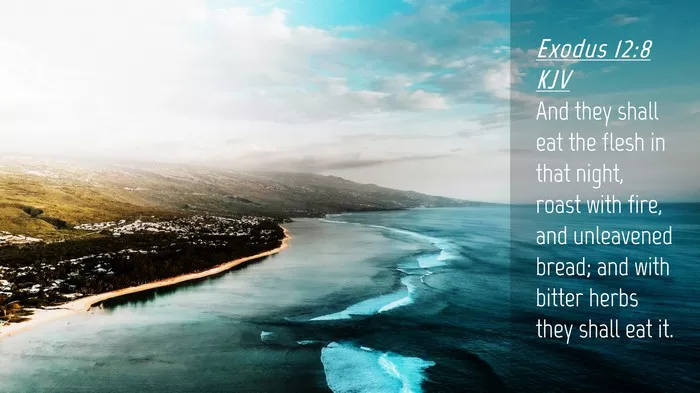Read the Daily Bible Verse – Exodus 12:8 To Strengthen Your Spiritual Journey.
Exodus 12:8 is a crucial verse in the Bible, rich in historical, spiritual, and theological meaning. Found in the book of Exodus, this verse is part of the detailed instructions for the first Passover, a pivotal moment in the liberation of the Israelites from Egyptian bondage. This article explores the context, meaning, and relevance of this verse, offering insights into its significance in both ancient and modern times.
The Context on Exodus 12:8 KJV
The book of Exodus recounts the story of Israel’s deliverance from slavery in Egypt. In chapter 12, God establishes the Passover, an event that commemorates the sparing of the Israelite firstborns during the tenth plague.
Exodus 12:8 in the King James Version (KJV) reads:
“And they shall eat the flesh in that night, roast with fire, and unleavened bread; and with bitter herbs they shall eat it.”
This verse occurs as God gives Moses and Aaron instructions for preparing the Passover lamb. It outlines how the meal is to be eaten and signifies the Israelite’s readiness for imminent departure from Egypt. The elements—roasted lamb, unleavened bread, and bitter herbs—carry deep symbolism, reflecting both the hardships endured and the redemption to come.
The Exodus 12:8 Meaning
Roasted Lamb
The roasted lamb represents the sacrificial offering to God. Its preparation, specifically roasted over fire, emphasizes the purity and completeness of the sacrifice. Unlike boiling or eating raw meat, roasting symbolizes judgment, as fire is often associated with God’s refining and purifying power (Malachi 3:2-3).
Unleavened Bread
Unleavened bread, prepared without yeast, underscores the haste with which the Israelites left Egypt. There was no time to allow the dough to rise, reflecting their immediate obedience to God’s command. Leaven often symbolizes sin or corruption in Scripture (1 Corinthians 5:6-8), making unleavened bread a representation of purity and sanctification.
Bitter Herbs
The bitter herbs recall the suffering and harshness of slavery in Egypt. Eating these herbs connects the Israelites to their past affliction, ensuring they remember the pain from which God delivered them. This element is a poignant reminder of God’s power to redeem and transform hardship into hope.
Exodus 12:8 Application in Life
Spiritual Readiness
Exodus 12:8 teaches believers the importance of readiness. Just as the Israelites had to be prepared to leave Egypt quickly, Christians must remain spiritually vigilant and ready for the Lord’s return (Matthew 24:44).
Gratitude for Deliverance
The bitter herbs remind us of our own past bondage to sin. By reflecting on the hardships we endured before God’s redemption, we cultivate gratitude for His saving grace.
Living a Sanctified Life
The unleavened bread calls for a life of holiness. By avoiding spiritual “leaven,” such as sin or worldly distractions, we align ourselves with God’s will and live as His sanctified people.
Comparison with Other Biblical Texts
The Passover and Christ’s Sacrifice
The Passover lamb in Exodus 12:8 foreshadows Jesus Christ, the “Lamb of God who takes away the sin of the world” (John 1:29). Just as the lamb’s blood spared the Israelites, Jesus’ sacrifice delivers believers from eternal death. This connection is highlighted in 1 Corinthians 5:7: “For even Christ our passover is sacrificed for us.”
The Symbolism of Fire
Throughout Scripture, fire is used to represent God’s judgment and refining process. For example, in Isaiah 48:10, God speaks of refining His people in the “furnace of affliction.” Similarly, the roasting of the lamb signifies God’s purifying work in delivering His people.
Remembering Affliction
The bitter herbs align with other biblical calls to remember past affliction, such as in Deuteronomy 6:12: “Then beware lest thou forget the Lord, which brought thee forth out of the land of Egypt.” This act of remembrance helps believers stay humble and dependent on God.
Modern-Day Relevance
The Lord’s Supper
The elements of Exodus 12:8 find fulfillment in the Lord’s Supper (Communion). The bread and wine commemorate Christ’s body and blood, connecting the Old Testament Passover with the New Covenant. When believers partake in Communion, they remember both the deliverance of Israel and Christ’s ultimate sacrifice.
Cultural Celebrations
For Jewish communities, the Passover meal (Seder) remains a vital tradition. It keeps alive the story of God’s faithfulness and liberation. Christians, too, can draw inspiration from this practice by incorporating intentional times of remembrance into their spiritual lives.
Personal Reflection
Exodus 12:8 invites modern believers to reflect on their spiritual journey. By meditating on God’s deliverance, we strengthen our faith and grow in our appreciation for His mercy.
Conclusion
Exodus 12:8 is a profound verse that bridges the Old and New Testaments. It encapsulates themes of sacrifice, deliverance, and sanctification, offering timeless lessons for believers. By understanding its context, meaning, and application, we can draw closer to God and live in greater alignment with His will.
As Christians, the verse challenges us to remember God’s faithfulness in the past, embrace His redemptive power in the present, and prepare for the ultimate deliverance that awaits us in eternity. The roasted lamb, unleavened bread, and bitter herbs are not merely elements of an ancient meal—they are symbols of a spiritual reality that continues to inspire and transform lives today.
Exodus 12:8 Commentary
Many biblical commentators emphasize the layered symbolism in Exodus 12:8.
Matthew Henry observes that the Passover meal symbolizes Christ’s role as both the Lamb of God and the sustenance for believers. He highlights the practical aspect of the meal—preparing the Israelites for the journey ahead.
Charles Spurgeon focuses on the spiritual readiness embodied by this verse. He draws parallels between the roasted lamb and Christ’s suffering, pointing to the fire as a symbol of God’s consuming judgment poured out on Jesus for humanity’s sake.
John Gill underscores the connection between unleavened bread and purity, urging believers to maintain a life free from sin as they await God’s ultimate redemption.
Related Topics:


